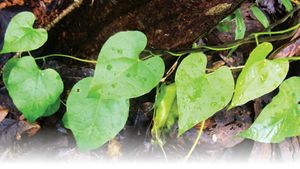Note: This is a project under development. The articles on this wiki are just being initiated and broadly incomplete. You can Help creating new pages.
Difference between revisions of "Tinospora cordifolia - Amrutha balli"
(→Commonly seen growing in areas) |
(→Leaf) |
||
| Line 21: | Line 21: | ||
==Identification== | ==Identification== | ||
===Leaf=== | ===Leaf=== | ||
| − | {{Leaf|Simple| | + | {{Leaf|Simple|No trichomes were found. The cross section shows a single layered epidermis and a wide zone of cortex composed of 3 to 4 layers of endodermis}}.<ref name="Leaf"/> |
===Flower=== | ===Flower=== | ||
Revision as of 18:20, 4 April 2018
Tinospora cordifolia which is known by the common names heart-leaved moonseed, guduchi and giloy is an herbaceous vine of the family Menispermaceae indigenous to the tropical areas of India, Myanmar and Sri Lanka.
Contents
Uses
Osteoarthritis, Pimples, Piles, Skin diseases, Diabetes, Blood pressure, Heart Diseases, Fever, Jaundice.
Parts Used
Chemical Composition
Columbin, tinosporaside, jatrorhizine, palmatine, berberine, tembeterine, tinocordifolioside, phenylpropene disaccharides, choline, tinosporic acid, tinosporal, and tinosporon have been isolated from Tinospora cordifolia.
Common names
| Language | Common name |
|---|---|
| Kannada | Amrutha balli |
| Hindi | geloy |
| Malayalam | Amruthu, Chittamruthu |
| Tamil | Shindilakodi |
| Telugu | Tippa-teega |
| Marathi | NA |
| Gujarathi | NA |
| Punjabi | NA |
| Kashmiri | NA |
| Sanskrit | Guduchi, amrita, cinnodbhava |
| English | Tinospora cordifolia |
Habit
Identification
Leaf
| Kind | Shape | Feature |
|---|---|---|
| Simple | No trichomes were found. The cross section shows a single layered epidermis and a wide zone of cortex composed of 3 to 4 layers of endodermis | {{{3}}} |
.[1]
Flower
| Type | Size | Color and composition | Stamen | More information |
|---|---|---|---|---|
| Unisexual | 14cm long | Pendulous, Ovoid | male flowers in axillary spikes, pendulous; female flowers in axillary spikes, ovoid |
Fruit
| Type | Size | Mass | Appearance | Seeds | More information |
|---|---|---|---|---|---|
| Syncarp (sorosis), subglobose or ellipsoid with long echinate processes, orange when ripe | seeds many, ovoid. | {{{6}}} |
Other features
List of Ayurvedic medicine in which the herb is used
- Vishatinduka Taila as root juice extract
Where to get the saplings
Mode of Propagation
How to plant/cultivate
The land is ploughed, harrowed, and made weed-free.A basal dose of FYM (farmyard manure) @ 10 tonnes per hectare and half dose of nitrogen (75 kg) are applied at the time of land preparation.About 2500 cuttings are required for plantation in 1 hectare of land.No specific treatment is required before sowing[2]
Commonly seen growing in areas
subtropical and tropical climate area, sandy loam soil.
Photo Gallery
References
- ↑ Cite error: Invalid
<ref>tag; no text was provided for refs namedLeaf - ↑ "vikaspedia"
External Links
- Artocarpus hirsutus on ENVIS Centre on Conservation of Medicinal Plants
- Artocarpus hirsutus on India Biodiversity Portal
- Artocarpus: A review of its traditional uses, phytochemistry and pharmacology
- Artocarpus: A review of its phytochemistry and pharmacology
- Pharmacognostical studies on the bark of Artocarpus hirsutus Lam
- Pages with reference errors
- Ayurvedic Herbs known to be helpful to treat Osteoarthritis
- Ayurvedic Herbs known to be helpful to treat Pimples
- Ayurvedic Herbs known to be helpful to treat Piles
- Ayurvedic Herbs known to be helpful to treat Skin diseases
- Ayurvedic Herbs known to be helpful to treat Diabetes
- Ayurvedic Herbs known to be helpful to treat Blood pressure
- Ayurvedic Herbs known to be helpful to treat Heart Diseases
- Ayurvedic Herbs known to be helpful to treat Fever
- Ayurvedic Herbs known to be helpful to treat Jaundice
- Herbs with Stem used in medicine
- Herbs with Roots used in medicine
- Herbs with Leaves used in medicine
- Herbs with common name in Kannada
- Herbs with common name in Hindi
- Herbs with common name in Malayalam
- Herbs with common name in Tamil
- Herbs with common name in Telugu
- Herbs with common name in Sanskrit
- Herbs with common name in English
- Habit - Vine
- Index of Plants which can be propagated by Seeds
- Index of Plants which can be propagated by Stem Cuttings
- Herbs that are commonly seen in the region of subtropical and tropical climate area
- Herbs that are commonly seen in the region of sandy loam soil
- Herbs









